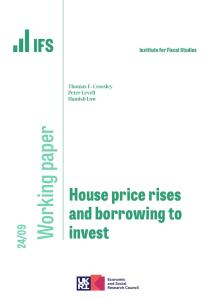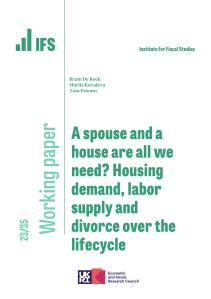Authors

Paul Johnson
Director
Paul has been the Director of the IFS since 2011. He is also currently visiting professor in the Department of Economics at University College London.
Explainer details
- DOI
- 10.1920/ex.ifs.2023.0016
- Publisher
- Institute for Fiscal Studies
Suggested citation
Johnson, P. (2023). The changes to the UK's net zero pathway explained [Explainer] Institute for Fiscal Studies. Available at: https://ifs.org.uk/articles/changes-uks-net-zero-pathway-explained (accessed: 30 June 2024).
More from IFS
Understand this issue

How to grow the economy
podcast
With an election on the way, economic growth is bound to be central to the campaigns. A leading expert explains how we can grow the economy.
24 May 2024

Public investment: what you need to know
explainer
Everything you wanted to know about UK public investment but were too afraid to ask – including analysis of Labour and Conservative plans.
25 April 2024

Should we worry about government debt?
podcast
David Miles joins us to discuss high government debt and its impact on the economy.
11 April 2024
Policy analysis

How do the last five years measure up on levelling up?
report
How well – or badly – has the UK fared on the 12 levelling up missions? We examine early progress and the scale of the challenge ahead.
19 June 2024

The Conservatives and the Economy, 2010–24
working paper
This chapter documents the course of the economy over the last 14 years for the forthcoming book 'The Conservative Effect, 2010-2024'.
3 June 2024

Making mortgage guarantees permanent will help some first-time buyers, but only if they can afford a bigger mortgage
comment
Today, Labour have pledged to make the government’s mortgage guarantee scheme permanent if they win power. We discuss the impact of such a scheme.
6 June 2024
Academic research

House price rises and borrowing to invest
working paper
We propose a borrow-to-invest motive by which house price gains affect household spending on residential investment.
27 March 2024

Police infrastructure, police performance, and crime: Evidence from austerity cuts
working paper
Focusing on a wave of austerity cuts, I show that police station closure increased violent crimes in census blocks near the defunct stations.
24 April 2024

A spouse and a house are all we need? Housing demand, labor supply and divorce over the lifecycle
working paper
We use a limited commitment framework to study how changes in marriage value affect household decisions over the lifecycle.
6 November 2023